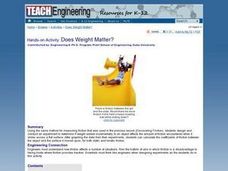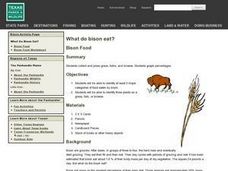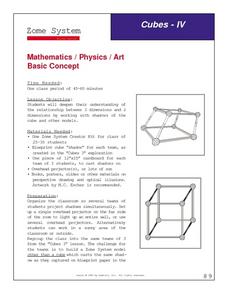Curated OER
Let's Tesselate
Students investigate the geometrical concepts of translation, reflection, and rotation. They make different observations looking for the concepts that are displayed in classroom items like floor tiles, carpet designs, and visuals hung in...
Curated OER
Topos, Compasses, and Triangles, Oh My!
Students triangulate using a compass, topographical (topo) map and a view of outside landmarks. They take a field trip to another location away from school and mark discernible landmarks (like mountains or radio towers) and changes in...
Curated OER
TE Activity: Does Weight Matter?
Students design and conduct experiment to determine if weight added incrementally to an object affects amount of friction encountered when it slides across a flat surface. They graph data from their experiments, and calculate...
Curated OER
Bouncing Balls
Middle schoolers work together to examine how different types of balls react to colliding with different surfaces. They discover the difference between elastic and inelastic collisions. They practice calculating momentum as well.
Curated OER
Getting Familiar with Fractals
Young scholars use the Internet to answer lab questions about fractals, and then construct fractals using the initial stage and iteration rule. They complete tables and generate rules for the "nth" term and create their own fractals.
Curated OER
Spongy Wetlands
Students sort things that absorb and things that do not absorb, They predict, orally or in writing, what happens to houses with or without wetlands. Students build a wetland area in a meat tray to show how wetlands absorb water, and they...
Curated OER
Mosaic Pavement Panel
Students analyze Mosaic art and identify the tessellation process. In this Mosaic art lesson, students read information about Mosaic art and the tessellation process. Students compare mosaics from various civilizations and construct...
Curated OER
Similar Triangles
Ninth graders find the height of every day objects using techniques learned through postulates that allow triangles in a problem to be similar. They calculate the length of a missing side and solve proportions.
Curated OER
From Lake to Tap
Middle schoolers use the Internet to study how water is treated to make it safe to drink. They use a tutorial on the U.S. Environmental Protection Agency's website to gain this information. They complete a worksheet for the assessment...
Curated OER
Introduction to Topographic Maps
Tenth graders create a topographic map and see how it represents different elevations. In this topographic maps instructional activity students read and interpret topographic maps.
Curated OER
Geometry: Practical Applications of the Distance Formula
Pupils, working independently and in groups, apply the distance formula to practical situations. After solving various problems, students in pairs design coordinate planes from the school blue print to measure the distance from the...
Curated OER
Keeps on Pumping
Students measure and calculate heart rates per minute and for other units of time. They determine the amount of blood pumped by their heart during various intervals of time.
Curated OER
Determining Mercantile Volume of a Pine Tree
Fourth graders, acting as foresters, determine timber volumes as sawtimber or pulpwood for marketing. They find the marketable value of a tree using its diameter and volume.
Curated OER
Modular Houses
Students, working in pairs, are presented with the problem. They are asked to design modular houses using four cubic modules, all the same size, which touch each other on complete faces. They must draw each of their houses on isometric...
Curated OER
What do Bison Eat?
Middle schoolers identify the three major categories of food eaten by bison. In groups, they collect examples of grass and forbs and press them. They complete a chart of the percentages of each type of food the bison eat in a day. ...
Curated OER
Cubes-IV
Students examine the relationship between three dimensions and two dimensions by working with shadows of cubes and other models. Students work in groups and use Zome System Creator Kits to try and build a shape other than a cube that...
Curated OER
Mandala Art
Students investigate art elements such as color schemes and proportion by creating their own personal Mandala Circle on paper or canvas. This also allows students to investigate mathematical concepts such as tesselations or social...
Curated OER
What Is Sustainability?
Students discuss environmental preservation and sustainability and their role in consumption and preservation. After a brief demonstration of how limited our resources are, students determine which natural resources they use most...
Curated OER
Tessellation Design And Construction
Students study the basic elements and concepts of the visual art's perceptual component - such as shape, line and color. They create tessellations that foster problem solving and reflective thinking.
Curated OER
2 x 2
Students work together to grid a 2 x 2 meter unit using the formula for the Pythagorean Theorem. After creating the grid, they identify the location of artifacts and create a map of their location. They develop a graph and table of their...
Curated OER
Water and Land 207
Students examine maps of different projections, mathematically calculate distortions, and note the advantages and disadvantages of each map. They study the different maps and transfer the map to graph paper.
Curated OER
Let It Rain
Students study the effects of water erosion on soil by gathering and analyzing data during an experiment. They decide on appropriate units of measurement to apply in problem solving.
Curated OER
Sliding and Stuttering
Students measure frictional force existing between a moving cup and the surface it slides on. They conduct the experiment and answer discussion questions.
Curated OER
Geometry Scavenger Hunt
Learners use the digital camera, identify geometric shapes (in nature as well as man-made), and gain a better understanding of geometric vocabulary. They search for and recognize geometric shapes in unusual settings

























